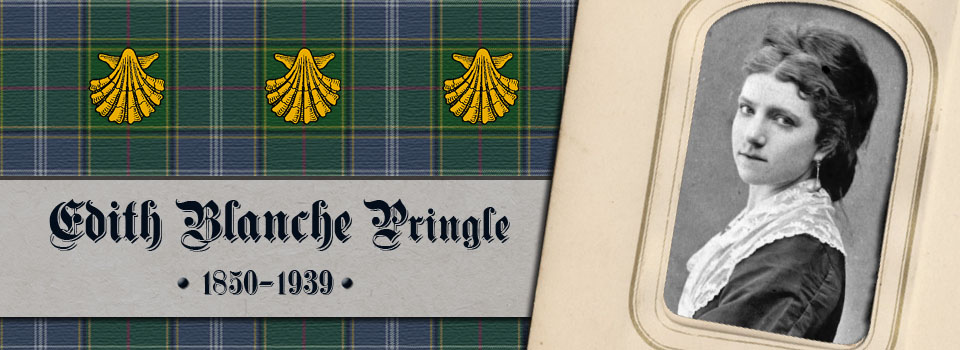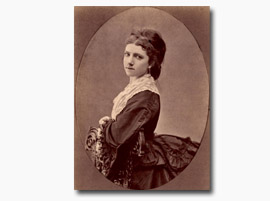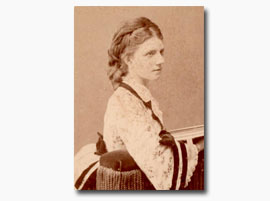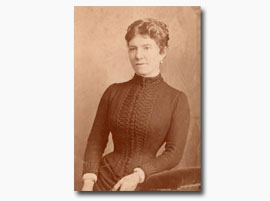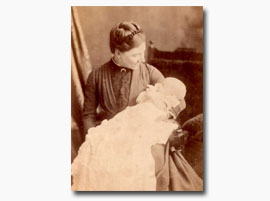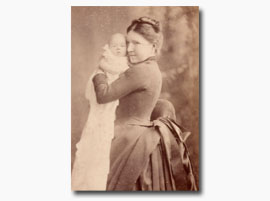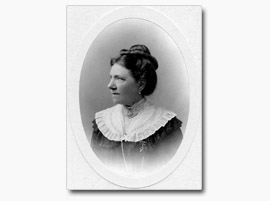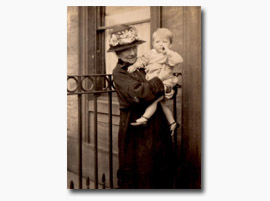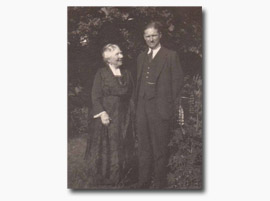Edith Blanche Pringle (1850 - 1939)
Edith Blanche was the seventh child and third daughter of John Pringle and Georgiana Ramsbottom, known to family and friends as "Blanche" and "Dot".
Blanche was born on the twentieth day of February 1850, at her parents' home at 76 Oxford-terrace, Hyde-Park, in London. Several weeks later, Claire Clairmont wrote that "Mrs. Pringle is doing very well. Such a nice fat little girl." This must have been the only time in her life that Blanche was ever described in this manner. She remained a very small, petite woman (hence her family calling her by the nickname "Dot").
Blanche's baptism took place, almost four months after her birth, at St. James, Paddington, on the sixth of June. In the 1851 census, baby Blanche was living with her family at their new home at 13 Kensington Gardens in Paddington and, within three years, the family had moved to 4 Bentinck-street in London. (Both of these houses are now gone, torn down either by the developer's destruction or the Blitz.) By the tender age of four years, Blanche had lived in at least three different houses (a pattern which she lived up to for the rest of her life). Shortly after her tenth birthday, Blanche and both of her sisters were elected as Fellows of the Royal Horticultural Society, a bit of a social club at this time and no illustration of a serious love of gardening on her part. (If any of the Pringle girls did care to garden, membership allowed them the use of some private acreage owned by the society, but there is no evidence at this time to suggest that the girls availed themselves of this privilege.)
By 1861, the Pringles were living at 3 Queen's Gate Terrace in Kensington, where 11-year-old Blanche is listed with her grandmother, parents, two sisters and her ten-year-old cousin, Evelyn Bootle-Wilbraham. Blanche and Evelyn were listed as "scholars", their governess a 25-year-old teacher from Germany called August Pohl. Blanche's maternal grandmother (the only grandparent she ever knew), Emma Ramsbottom, had lived with the Pringles since at least 1851, continuing to do so until right after Blanche's thirteenth birthday (separated only by the grandmother's death).
Blanche's life was filled with a more-than-average share of personal sorrow and loss. It began shortly before Christmas 1858, when she was just eight years old, and her oldest brother, Henry, died (of what was most likely cerebral malaria) on his way home from Cambridge during the Christmas holiday. Three years later, news of the death in India of Blanche's older sister, Violet, reached London. Blanche was sixteen years old and had already lost two of her six siblings.
In April 1867, Blanche's second sister, Eleanor (Nell to the family), married the Russian General Serge Plaoutine in Nice, France. The Pringles spent a lot of time in France, and it seems probable that they visited Russia, too. (Blanche was so fluent in French that she was later mistaken for a Frenchwoman.) In the summer of the following year, Blanche went with her parents to spend a holiday at Bex, Switzerland. On Sunday, 26 Jul 1868, after having been there for some weeks, tragedy struck. Blanche's father went for a walk in the late afternoon, and the family became alarmed when he did not return during the evening. On the following morning, a public search was organized, and abandoned only after 100 men fruitlessly combed the area and came up empty-handed. One week later, John's body was found at the bottom of a 200-foot perpendicular precipice, with evidence (a broken pocketwatch) showing that he had lost his way in the dark and fallen to his death in the early hours of the previous Monday morning (many hours after he had left the house for his walk). How sad must it have been for Blanche and her mother, waiting at home for the father and husband who would never return. How long those eight days would have seemed, and the waiting could only have made the end that much harder to bear. John was buried (the day after the discovery) at the local cemetery in Bex, and Blanche forever kept black-and-white photos of the large tomb erected over her father's grave with another photo of the precipice (marked with an "x" on the spot where John fell) in a black-bordered envelope inscribed by her with the sad words, "Photographs of Dear Pappie's Tomb".
Back to England and, not quite three years later, Blanche and her mother were living alone in a flat at 34 Eversfield Place in Hastings. They were out of the country at the time of the 1881 census, a not-unnatural occurrence, but one can safely assume that many addresses for Mother and Daughter had come and gone during those ten years. Before leaving for Malta (at some unknown date), a lease was taken for 15 Queen's Gate Terrace in South Kensington, London (just doors down from one of Blanche's childhood homes), and the pair left on a journey to foreign parts. It was in Malta that Georgiana, Blanche's dear mother, died on 23 Jun 1884. Mother had been living at the Grand Hotel in Malta for some time prior to her death, and everything points to Blanche being there with her. Georgiana was buried in Malta, and Blanche's brother, Captain Eliot Pringle, R.N., quickly sailed to Malta to remove Blanche from the island and return her to England. On their way home, they spent some time (possibly two or three months) in Constantinople, where Blanche succumbed to Typhoid fever. Back home to Brighton by May of 1885, she had at least two photographs taken at the time of her return (marked by Blanche with a note about her hair being short because of having been cut when she had Typhus). Her brother, Captain Eliot, remained in Brighton for some time after this, residing at 76 Marine-parade in Brighton, and it appears that Blanche lived with him.
On 30 Jul 1885, Blanche married Lieutenant-Commander Henry Hastings Jauncey, R.N., at St. Peter's Church in Brighton. How they met is not recorded, but their marriage proved a short and sorrowful one for Blanche.
Jauncey suffered from tuberculosis, which he seems to have contracted about the time of their marriage (if not before). He had his name placed on the Royal Navy retirement list on 1 Jun 1886, presumably due to health problems. The couple made a home at 57 Upperton-Gardens in Eastbourne, and it was there that Blanche gave birth to their first child, a stillborn son, on 22 Sep 1886. A year later, on 30 Nov 1887, Blanche gave birth to a second son, George Pringle Jauncey. How happy she must have been with her new baby! On the fifth day of March in 1888, when George was just three months and five days old, Blanche was in Bournemouth, having two precious photographs taken with her child. Not long after that, the little family took a house at Sandown on the Isle of Wight, hoping to improve Jauncey's health.
Yet again, however, Blanche suffered another loss. Her baby, George, died at Sandown on 29 Jul 1888. He was just one day shy of eight months old. They buried him three days later at Christ Church there in Sandown, and poor Blanche had lived to bury both of her babies. It was either in the winter of 1886 or 1888 that Blanche and her husband journeyed to St. Moritz in Switzerland. This was, according to the family, for the sake of her husband's health, but it seems that it could well have been for the sake of Blanche's health as well. After losing one (or two) babies, Blanche must have been quite in need of a rest.
By the spring of 1889, the Jaunceys were back in Eastbourne, where Blanche gave birth to a third son, John Henry (lovingly called "Jack" by the family), on 14 Apr 1889. Jack was a beautiful and healthy baby, and it's obvious that Blanche adored her son. Sadly, her happiness was once again covered by sorrow, for Jauncey's health quickly and quietly failed soon after Jack's birth. The family spent the winter at Granville House in Sandown, Isle of Wight, where, on 9 Feb 1890, Blanche lost her husband of just four-and-one-half years. Just days away from her fortieth birthday, Blanche buried her beloved husband at Christ Church, near where their son had been buried less than two years before.
How surprised Blanche must have been to learn that she was expecting another child, although she would probably not have known this until some time after her husband's death. The baby was a girl, and Blanche named her Eleanor Violet (for Blanche's sisters). Eleanor was born on 3 Sep 1890 at Cheriton, Beulah Hill, Norwood, Surrey, a home belonging to Jauncey's family.
Blanche was now considered the "poor relation" by the family. Not surprising, when compared to the high rank and positions held by her close relations. She was helped, throughout her life, by her siblings and cousins, particularly her brother, Eliot, and sister, Nell. In the 1891 census, Blanche is living at 1 Percival Terrace in Brighton with her elderly maternal aunt, Emily Bootle-Wilbraham. In 1893, Blanche took her two small children and went to Russia to the home of her sister, Eleanor "Nell" Plaoutine. Many pictures and sketches survive from this trip (showing that they were at Tsarskoe-Selo in the winter), but how long they were there and where they stayed was not recorded. Blanche employed a nurse governess, Elizabeth Sims, for her children, the only long-time servant that Blanche seems to have ever had. After returning from Russia, Blanche and her children lived at 23 Portland-place in Kemptown, Brighton. Just how long they remained there is unknown, but their residency last from 1894 to 1897 at the least.
By the 1901 census, Blanche and her children were living at 29 Western Parade in Southsea Common, Portsmouth, during the same year that her brother leased Broke Hall in Ipswich. Blanche decided to buy a house near her brother, so she began looking in Ipswich and found Ashmead (27 Graham Road), one of a "new row of pleasant red-brick ones just built, in a quiet road which was at the edge of town". Blanche lived (and died) at Ashmead, and never again did she have to pack for a move or sign a new lease.
Time passed, Blanche's siblings passed away, and Blanche and Eleanor stayed close to home. As she grew older, Blanche's mental state slowly deteriorated, and she became harder to deal with. A nurse was brought in to help and became a fast friend of Blanche's daughter, Eleanor. Two days before Christmas, on 23 Dec 1939, Blanche breathed her last and was buried at All Saints' Church in Ipswich four days later. A Portland Stone Memorial with Carved Crest was erected over the grave during the following summer.
Since no letters from Blanche have survived, her personal characteristics and habits have to be gleaned from bits and pieces of stories remembered by the family. She was quite small in stature, and her family always said that she was the height of Queen Victoria — five feet in her prime! She played the piano and bought an upright with a lovely, soft tune in 1900. Over the years, the piano was saved, despite the family moving to different houses and putting all the furniture in storage a couple of times. She also enjoyed art, and she passed on a love for all the "pictures and galleries" to her daughter. Blanche walked to church every Sunday and liked to visit with family and friends. She was well loved by the family and had friends throughout the neighborhood in Ipswich. She loved her children most of all but had a rather possessive and demanding personality. She was uncomfortable living on her own, so her daughter, Eleanor, remained unmarried, and the two lived together until only death separated them.
Blanche had been born into an old-fashioned, well-to-do family during the height of the Victorian era. Her siblings moved in high society. One of her sisters was even reported as a "reigning blonde beauty of London" in the late 1860s. Blanche and her siblings were considered by the younger family members to be "living 100 years out of date". This seems to have been a family trait dating as far back as the 18th century, but Blanche was the last surviving member of a long string to live her entire life in this old-fashioned way. On top of all her personal sorrows, how difficult it must have been for her to outlive all of her siblings and the whole style of life to which she was accustomed.
Blanche was less than two months away from her ninetieth birthday at the time of her death. Her life had spanned a century of great change. She had lived through the reigns of five monarchs, including the abdication of Edward VIII. Her much-loved nieces and nephews had been murdered by the Bolsheviks during the Russian Revolution. As a young girl, her family members had served in the Crimea and India, fighting and dying in the Crimean War and barely escaping the notorious Indian Mutiny of 1857. She lived through the Russo-Turkish War, the Second Afghan War, the Second Opium War, the Third Anglo-Burmese War, the Anglo-Zulu War, the Boer War and the First World War. At the time of her death, England was just three months into the Second World War. Blanche witnessed the birth of the automobile, telephone, electricity and the appliances which accompany it, airplanes, ready-made clothes, and shoes made to fit either the right or left foot. She lived to see the disappearance of streets filled with horsedrawn carriages, chamber pots, large country houses filled with servants, bustles and hoop skirts, and sad irons. Her death certainly did mark the end of an era in England, and the country would not emerge from the new war as the same place in which Blanche had lived.
